|
|
|
Sort Order |
|
|
|
Items / Page
|
|
|
|
|
|
|
| Srl | Item |
| 1 |
ID:
111430
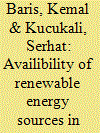

|
|
|
|
|
| Publication |
2012.
|
| Summary/Abstract |
This study aims to explore the availability and potential of renewable energy sources in Turkey as well as assessing related government policies, financial and environmental aspects of renewable energy projects. Turkey is a country which has the highest hydropower, wind and geothermal energy potential among European countries. As a European Union (EU) candidate several incentives were developed in Turkey for electricity generation from renewable energy sources by the enactment of Law No. 5346 in 2005 which was later restructured by Law No. 6094 in 2010. The most important ones are: ease of land acquisition and feed-in-tariffs which promise purchasing of electricity generated and domestic manufacturing of equipment by the private companies with a price of 5.30-9.69 and 0.3-2.55 €c/kWh, respectively, depending on the type of the renewable and the equipment. However, feed-in tariff amounts take reservoir area into account instead of installed capacity for hydroelectric power plants. Moreover, Environmental Impact Assessment (EIA) report is not mandatory for all renewable energy plants. According to the multi-criteria analysis tool developed in this study to evaluate the renewable energy source (RES) technologies the most appropriate renewable energy alternative for Turkey is biomass, simply because of the highest social benefit among others.
|
|
|
|
|
|
|
|
|
|
|
|
|
|
|
|
| 2 |
ID:
123286
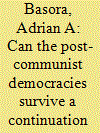

|
|
|
|
|
| Publication |
2013.
|
| Summary/Abstract |
The global financial crisis and its prolonged European aftermath have created a major stress test for democracy in the ten new post-communist members of the European Union. Although a majority of these transitional states have so far withstood the test reasonably well on the economic side, three have lost significant ground on the democracy front. There is also reason for concern that continued Euro-stagnation could lead to additional regression not only in the three countries that have been backsliding but possibly also in others. This could jeopardize the extraordinary progress in post-communist democratization and Western integration achieved with the help of U.S. and EU policy in the 1989-2004 period.
|
|
|
|
|
|
|
|
|
|
|
|
|
|
|
|
| 3 |
ID:
144988
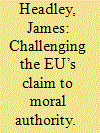

|
|
|
|
|
| Summary/Abstract |
Normative Power Europe is not just an academic concept: it is part of the self-understanding of many EU policymakers. They believe that the EU is setting standards of state behaviour in Europe and globally. The EU is regarded as an elaborator and epitomizer of European and ‘civilised’ values, as a model for other regions and states and as inherently an ethical actor. Russian policymakers reject these notions and, in doing so, increasingly accuse the EU of ‘double standards’, arguing that EU external action is inconsistent and does not always match its rhetoric; that the rhetoric therefore masks the pursuit of interests in its foreign policy; that the EU is like any other state (or state-like entity) and has no special claim to act ethically or to be a moral authority; and that internally, the EU does not live up to the values it seeks to impose on others. This article gives examples of Russian talk of EU double standards, analyses the motivations and assesses the likely impact. It argues that for such criticism to have any impact on EU policy, the critic must be seen as a moral equal, which the EU’s sense of moral superiority over Russia rules out.
|
|
|
|
|
|
|
|
|
|
|
|
|
|
|
|
| 4 |
ID:
142413
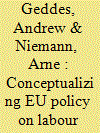

|
|
|
|
|
| Summary/Abstract |
This introduction sets the scene for the articles in this themed section. The starting point is the relatively recent but important developments that have occurred in the area of EU labour migration such as the 2009 ‘Blue Card’ directive covering highly qualified migrants, the 2011 single-permit directive covering residence and work, and a 2013 directive on seasonal workers. The article specifies the legal, policy and institutional developments in this area and discusses their significance. To facilitate reflection on the effects of these developments, the introduction focuses on underlying behavioural logics—that is, modes of action—that could account for the development of EU competencies and that then emerge as themes within the papers in this themed section. The first is an instrumental logic that focuses on the ways in which key actors pursue their interests.
|
|
|
|
|
|
|
|
|
|
|
|
|
|
|
|
| 5 |
ID:
163736
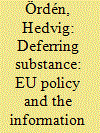

|
|
|
|
|
| Summary/Abstract |
The article describes EU cross-sectoral policy work on online information threats, focusing on the intersection between values and 'referent objects'. Examining discussions on strategic communication, censorship, media literacy and media pluralism, two value-perspectives were identified: while abstract procedural values of efficiency and coherence guide content management in the security/defence/internet communities, media/education communities highlight the end-goals of content pluralism and enhanced citizen judgement. In implementation, the former’s lack of substantive goals, coupled with an outsourcing of content management, may give rise to hybrid values. The findings highlight the danger of neglecting substance in favor of efficient management of an online ‘battlespace’.
|
|
|
|
|
|
|
|
|
|
|
|
|
|
|
|
| 6 |
ID:
117786
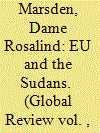

|
|
|
| 7 |
ID:
088212
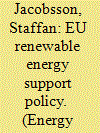

|
|
|
|
|
| Publication |
2009.
|
| Summary/Abstract |
The recent EU Commission proposal for promoting the supply of power from renewable energy sources was originally based on a pan-European, harmonised tradable green certificate (TGC) scheme. We suggest, on the basis of a multi-disciplinary analysis, that a pan-EU TGC system is not the way forward for Europe. It is vital that the Commission (and the majority of Member States) avoids implementation of such policy designs put forward by a coalition of vested interests. They should instead look at, and act upon, the available evidence from those countries that have experimented with TGCs (e.g. Flanders, UK and Sweden) and design policies that stand a better chance of meeting the criteria of effectiveness, efficiency and equity. In particular, the policies must enable EU to meet the immense innovation/industrialisation challenge by inducing the development of a capital goods industry that can, eventually, diffuse a broad range of technologies that use renewable energy sources. Only then we can acquire an ability to implement an industrial revolution in the energy system in a way that broadly meets the criteria of effectiveness and dynamic efficiency.
|
|
|
|
|
|
|
|
|
|
|
|
|
|
|
|
| 8 |
ID:
126617
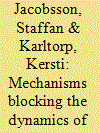

|
|
|
|
|
| Publication |
2013.
|
| Summary/Abstract |
Decarbonizing electricity production in the EU may necessitate building new "low-carbon" capacity (excluding nuclear investments) to deliver 3500 TWh by 2050. Offshore wind power has the potential to contribute substantially to fill this gap. Realizing this potential is, however, difficult since deployment offshore does not constitute a simple diversification by the onshore wind turbine industry to a new segment. This paper identifies factors obstructing the development of the northern European innovation system centered on offshore wind power, specifies a set of associated policy challenges and discusses various policy responses.
|
|
|
|
|
|
|
|
|
|
|
|
|
|
|
|
| 9 |
ID:
142390
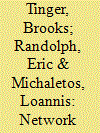

|
|
|
|
|
|
|
|